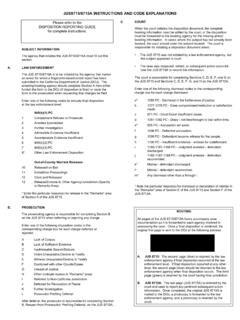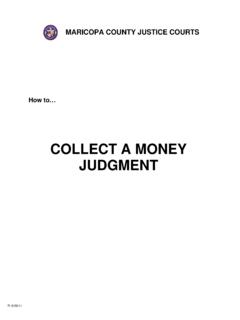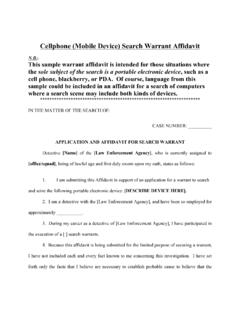Transcription of Search and Seizure Case Briefs - Caught.net
1 Search and Seizure case Briefs Commonwealth of Kentucky, Justice Cabinet Department of Criminal Justice Training Legal Section REVISION 7/20/01 i Fourth Amendment to the United States Constitution The right of the people to be secure in their persons, houses, papers, and effects, against unreasonable searches and seizures, shall not be violated; and no warrants shall issue, but upon probable cause, supported by oath or affirmation, and particularly describing the place to be searched and the persons or things to be seized. Constitution of the Commonwealth of Kentucky Sec. 10 Security from Search and Seizure Conditions of issuance of warrant The people shall be secure in their persons, houses, papers and possessions, from unreasonable Search and Seizure ; and no warrant shall issue to Search any place, or seize any person or thing, without describing them as nearly as may be, nor without probable cause supported by oath or affirmation.
2 Advisory Warning: The Kentucky Search & Seizure case Briefs is designed as a study and reference tool for officers in training classes. Although care has been taken to make the case Briefs included as accurate as possible, official copies of cases should be consulted when possible before taking any actions which may have legal consequences. The issues and holdings which appear in each brief are only the opinions of the compilers of the case Briefs . They are only meant to be used for guidance in statutory and case interpretation, are not offered as legal opinions, and should not be relied upon or cited as legal authority for any actions. Always consult legal counsel when in doubt about the meaning of a statute or court decision. ii TOPICAL INDEX I Seizure a. Arrest Bad Elk v. Henry Smith v. Ohio Atwater v. City of Lago Vista b. Definition of Seizure Brower v.
3 Inyo Florida v. Bostick Illinois v. McArthur Michigan v. Summers Payton v. New York v. Place II Search a. Definition of Search Bond v. Steagald v. b. Situations that do not have Fourth Amendment protection 1. Abandoned Property California v. Greenwood 2. Consent Search Bumper v. North Carolina Florida v. Royer Illinois v. Rodriguez Ohio v. Robinette Schneckloth v. Bustamonte v. Mendenhall 3. Flyovers California v. Ciraolo Dow Chemical Co. v. Florida v. Riley 4. Open Fields Hester v. Oliver v. v. Dunn 5. Plain View Horton v. California Sedillo v. 6. Public Area v. Santana iii c. Basic Concepts 1. Anonymous Tips Florida v. 2. Exclusionary Rule Mapp v. Ohio Silverthorne Lumber Co. v. Weeks v. v. Leon 3. Probable Cause Director General of Railroads v. Kastenbaum Illinois v.
4 Gates 4. Reasonable Expectation of Privacy Arizona v. Hicks Katz v. Kyllo v. O Connor v. Ortega Rawlings v. Kentucky Schmerber v. California v. Chadwick 5. Reasonable Suspicion Brown v. Texas d. Search warrant 1. No-Knock Ker v. California Richards v. Wisconsin 2. Search warrant Affidavit Aguilar v. Texas Illinois v. Gates Whiteley v. Warden 3. Administrative warrant Michigan v. Tyler Michigan v. Clifford 4. Area Search warrant Camara v. Municipal Court See v. City of Seattle e. Exigent Circumstances 1. Body Evidence Cupp v. Murphy iv 2. Closely-Regulated Business v. Biswell 3. Crime Scene Search Thompson v. Louisiana Mincey v. Arizona Flippo v. West Virginia 4. Hot Pursuit Warden of Maryland Penitentiary v. Hayden 5. Inventory Search (vehicles) Colorado v. Bertine South Dakota v. Opperman Florida v. Wells 6.
5 Search Incident to Arrest Agnello v. Chimel v. California New York v. Belton v. Robinson Wyoming v. Houghton 7. Search Incident to Citation Knowles v. Iowa 8. Surgery Winston v. Lee 9. Sweep Search Maryland v. Buie 10. Terry Stops/Terry Frisks Illinois v. Wardlow Michigan v. Long Minnesota v. Dickerson Terry v. Ohio v. Sharpe Ybarra v. Illinois 11. Vehicle Exception Search Brinegar v. California v. Acevedo California v. Carney Carroll v. Chambers v. Maroney Michigan v. Dyson v. Johns v. Ross 12. Vehicles - Miscellaneous Concepts City of Indianapolis v. Edmond (narcotics roadblock) Delaware v. Prouse (standard of cause for vehicle stop) Maryland v. Wilson (removing passenger from vehicle) v Michigan Dept. of State Police v. Sitz (DUI roadblock) Pennsylvania v. Mimms (removing driver from vehicle) Whren v.
6 (pretext stop) vi Search and Seizure Table of Cases (by Plaintiff) Agnello v. 5 Aguilar v. Texas _____ 10 Arizona v. Hicks _____ 55 Atwater v. Lago Vista ___ 78 Arkansas v. Sanders ___ 33 Bad Elk v. _____ 1 Beck v Ohio _____ 11 Bond v. _____ 75 Brinegar v. _____ 6 Brower v. County of Inyo_____ 58 Brown v. Texas _____ 35 Bumper v. North Carolina _____ 15 Cady v. Dombrowski ____ 31 California v. Acevedo ___ 63 California v. Carney ____ 52 California v. Ciraolo ____ 52 California v. Greenwood _____ 57 California v. Hodari D. _____ 61 Camara v. Municipal Court_____ 12 Cardwell v. Lewis _____ 22 Carroll v. _____ 4 Chambers v. Maroney __ 18 Chimel v. California ____ 17 City of Indianpolis v. Edmond _____ 76 Colorado v. Bertine _____ 54 Cupp v. Murphy _____ 21 Delaware v. Prouse ____ 33 Dir. Gen.
7 Of Railroads v. Kastenbaum _____ 3 Dow Chemical Co. v. 53 vii Flippo v. West Virginia _____ 72 Florida v. Bostick _____ 64 Florida v. Jimeno _____ 63 Florida v. _____ 74 Florida v. Riley _____ 57 Florida v. Royer _____ 41 Florida v. Wells _____ 60 Henry v. _____ 7 Hester v. _____ 3 Horton v. California _____ 49 Illinois v. Gates _____ 42 Illinois v. McArthur _____77 Illinois v. Rodriguez ____ 60 Illinois v. Wardlow _____ 74 Katz v. _____ 15 Ker v. California _____ 9 Knowles v. Iowa _____ 70 Kyllo v. _____ 79 Lo-Ji Sales, Inc. v. New York _____ 34 Mapp v. Ohio _____ 8 Maryland v. Buie _____ 59 Maryland v. Dyson _____ 73 Maryland v. Wilson ____ 68 Massachusetts v. Sheppard _____ 46 Michigan v. Clifford ____ 44 Michigan v. Long _____ 44 Michigan v. Summers ___ 39 Michigan v. Tyler _____ 28 Michigan Dept.
8 Of State Police v. Sitz _____ 62 Mincey v. Arizona _____ 30 Minnesota v. Carter ____ 70 Minnesota v. Dickerson _ 65 viii New York v. Belton _____ 39 O Connor v. Ortega ____ 54 Ohio v. Robinette _____ 68 Oliver v. _____ 45 Payton v. New York ____ 36 Pennsylvania v. Kilgore _ 67 Pennsylvania v. Labron _ 67 Pennsylvania v. Mimms _ 27 Rakas v. Illinois _____ 30 Rawlings v. Kentucky __ 37 Richards v. Wisconsin __ 69 Schmerber v. California _ 11 Schneckloth v. Bustamonte _____ 20 Sedillo v. _____ 23 See v. City of Seattle ___ 13 Silverthorne Lumber Co. v. _____ 2 Smith v. Ohio _____ 59 South Dakota v. Opperman _____ 25 Steagald v. _____ 38 Terry v. Ohio _____ 16 Thompson v. Louisiana _ 48 v. Biswell _____ 20 v. Chadwick _____ 26 v. Dunn _____ 56 v. Johns _____ 49 v. Leon _____ 47 v. Mendenhall ____ 37 v. Place _____ 41 v.
9 Robinson _____ 22 v. Ross _____ 40 v. Santana _____ 24 v. Sharpe _____ 50 ix v. Watson _____ 24 Warden of Maryland Penitentiary v. Hayden _ 13 Weeks v. _____ 2 Whiteley v. Warden, Wyoming State Penitentiary _____ 19 Whren v. _____ 66 Wilson v. Arkansas ____ 66 Winston v. Lee _____ 51 Wyoming v. Houghton __ 71 Ybarra v. Illinois _____ 36 Zurcher v. The Stanford Daily _____ 29 1 Search & Seizure Selected case Briefs _____ John Bad Elk v. 177 529, 20 S. Ct. 729 (1900) FACTS: John Bad Elk was convicted of the murder of John Kills Back at the Pine Ridge reservation in South Dakota. On March 8, 1899, Bad Elk was alleged to have fired several shots near his home. (There was no law prohibiting this action, nor was there any indication of an improper intent in the record.) Captain Gleeson, a police officer on the reservation, asked him about it, and Bad Elk admitted to firing for fun.
10 Gleeson told him to come by the office to talk about it. Bad Elk did not appear at the office. Several days later, he ordered three tribal officers to find and arrest Bad Elk. No charge was ever given. They went to the home and found Bad Elk, who said he would go with them in the morning. They reported this to Gleeson, who told them to go back to the house, watch Bad Elk, and take him to the agency office in the morning. When they returned, the followed Bad Elk on a short trip to a neighbor s home. When he returned, he asked them What are you bothering me for? After further discussion, it is alleged by the prosecution, Bad Elk shot and killed Officer Kills Back. Bad Elk alleged that the officers had drawn or were drawing their weapons, and that he fired in self-defense. Bad Elk argued that the instructions given to the jury were in error, by stating that the plaintiff had no right to resist the arrest.





